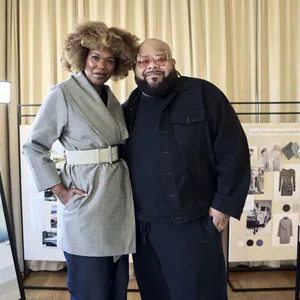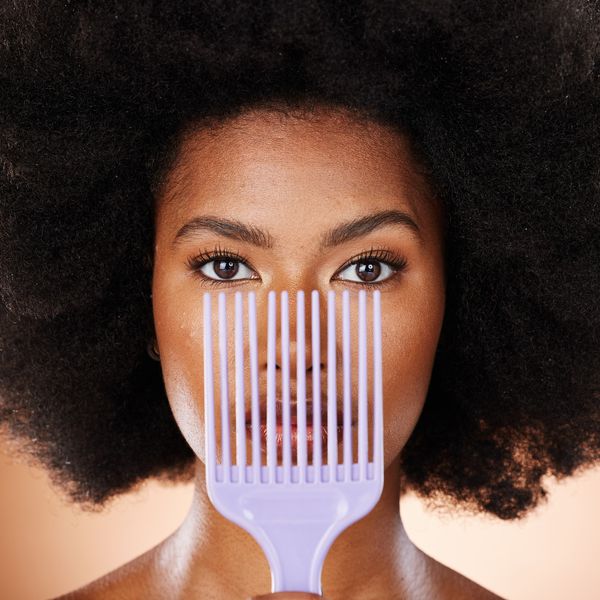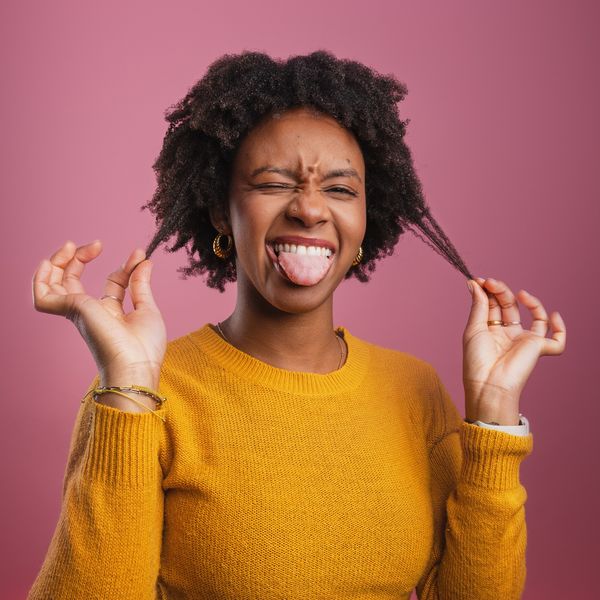To me, a Black woman's hair is a lot like silk. In some ways, it's extremely fragile while in others, it's strong as nails. Just think about it. Our hair can endure heat, braids, weaves and wigs and all of the freaking chemicals that we put in it for weeks and sometimes even months on end. On the flip side, when we don't eat properly, stay hydrated, condition our hair and clip those split and/or dead ends, our strands can snap without barely even touching them. That is why a lot of us struggle with keeping the edges of our hair and the nape of our neck flourishing (well, that and beating our edges to death with alcohol-based edge control products).
If a goal that you've got this year is to see some more inches on your head, and you're hoping that your edges and nape will keep up, here are seven things that you can do to get both of the most fragile parts of your head to "walk in agreement" with you.
How To Grow Your Edges & The Nape Of Your Neck
1. Use Some DIY Shampoo

The sides of our hair and the nape of our neck can take on quite a bit of friction which can result in weak hair and damaged follicles. Then, when you add to that the sweat and product build-up that our hair also endures, sometimes it's best to avoid commercial brands of shampoos and go the au naturel route. If you'd like to treat your hair to a chemical-less cleaning experience, try this DIY shampoo recipe.
In a plastic bottle, mix:
- 3 tablespoons of apple cider vinegar (the kind that still has "the mother" in it; it clarifies your hair and scalp)
- 1 tablespoon of baking soda (it also clarifies your hair and scalp)
- 1 teaspoon of jojoba oil (it strengthens hair while preventing hair loss)
- 4 drops of lavender oil (it reduces scalp inflammation and encourages hair growth)
- 3 drops of tea tree oil (its antiseptic and anti-inflammatory properties remove bacteria and dead skin)
- 2 drops of peppermint oil (it stimulates hair growth)
Fill the rest of the bottle up with warm distilled water. Shake the bottle and then apply the shampoo to your damp hair, making sure to massage your scalp; especially your edges and nape. Let the shampoo penetrate for 5-7 minutes. Then rinse and deep condition (making sure to pay extra attention to your edges and nape) as usual.
2. Massage and Moisturize
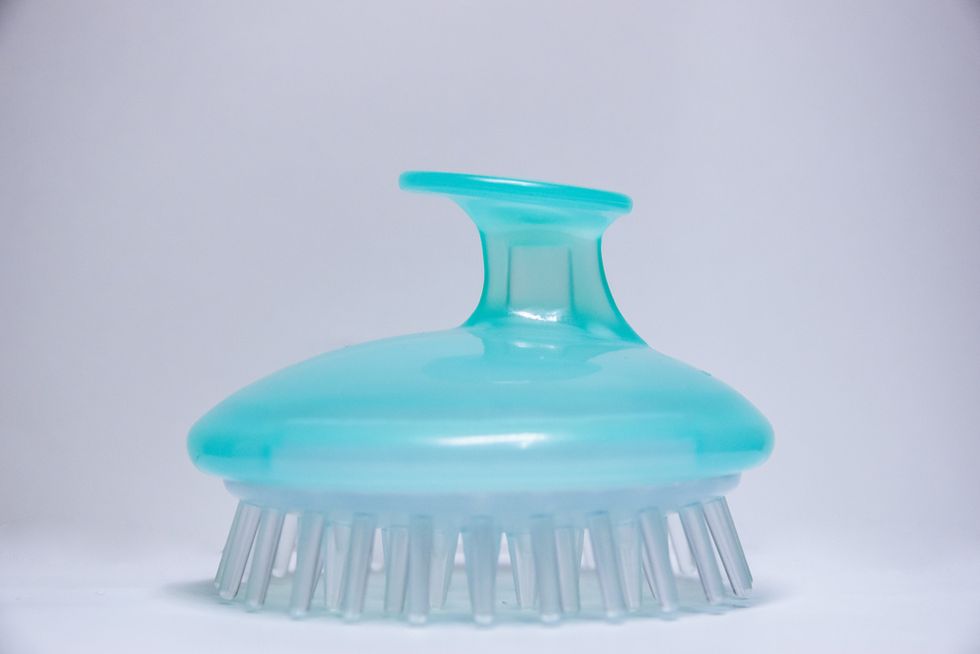
Since it's the nutrients in our blood that feed our hair follicles, it is important that we increase the blood flow to our scalp. A great way to do that is to massage your scalp, for 15 minutes, no less than a couple of times each week. In fact, if you want to significantly increase the thickness of your hair, you should perform a scalp massage on a daily basis.
If you'd prefer to use an actual massager on your head, Naptural85 posted a pretty thorough review on some of her favorite ones (you can check that out here). But honestly, your fingertips can be just as effective. Another YouTuber who goes by ANGIEBEE broke down how to effectively use your hands on your head here. Please just make sure that your hands are clean, that you use the tips of your fingers and not your nails—oh, and that you put some oil on your fingers before you begin. Jamaican black castor oil is a great one because, not only does it moisturize your scalp and hair, it is also able to thicken and strengthen it over time too.
3. Add Camphor Oil to Your Hair Regimen
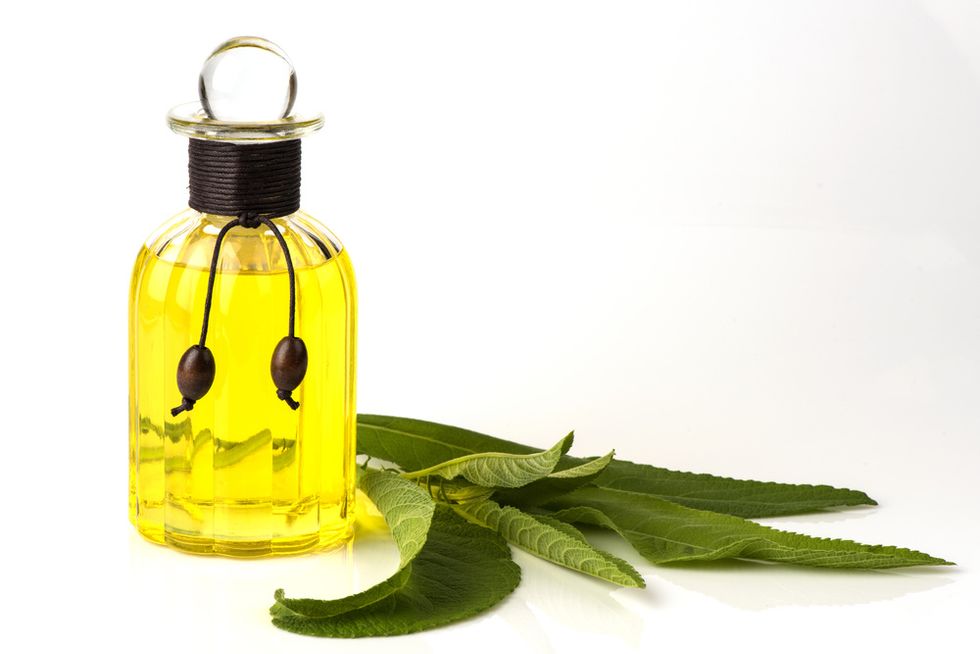
If you're a fan of essential oils, you definitely need to add camphor to your collection. The properties in it can do everything from reduce pain and inflammation and treat nail fungus to treat eczema and promote a good night's rest. The reason why camphor oil is mentioned in this article is because it's also a wonderful stimulant and decongestant. If you apply it to your edges and nape, not only will it increase blood circulation to those areas so that your hair follicles will get more of the nutrients that they need, but it will help to heal any scalp infections that you might have too. Just make sure to use this oil with a carrier one like coconut, grapeseed, avocado, sweet almond oil or castor oil. 15 drops of camphor in a 4 oz. bottle of your carrier oil should have you pretty set. You should start to see real results within a month or so.
4. Lower Your “Chemical Dosage”

I rocked a texturizer for many, many years. Contrary to a lot of people's beliefs about 'em, texturizers are chemical relaxers; they just aren't as strong as the ones that we use in order to get our hair bone straight. Anyway, because I would cut and texturize my hair at home (often too), when I did finally decide to grow my hair out, it took a while for one side of my edges to catch on that I was serious. What I mean by that is, all of the chemical processing (including hair dye) had actually damaged some of my hair follicles. It has taken a couple of years of scalp massaging and babying that side of my head with Jamaican black castor oil (my personal favorite brand is Mango & Lime in lavender and rosemary) to get the thickness back. What that time has taught me is, it really is best to leave the chemicals totally alone.
But, if you must, make sure that you relax and color your edges and nape last. Also, make sure you leave that stuff on for a shorter amount of time. If you're not doing that, well, it makes total sense why your edges and nape may not be flourishing as much as you'd like for them to. Chemicals tend to do more harm than good.
5. Rebuild Your Hair Follicles with Supplements
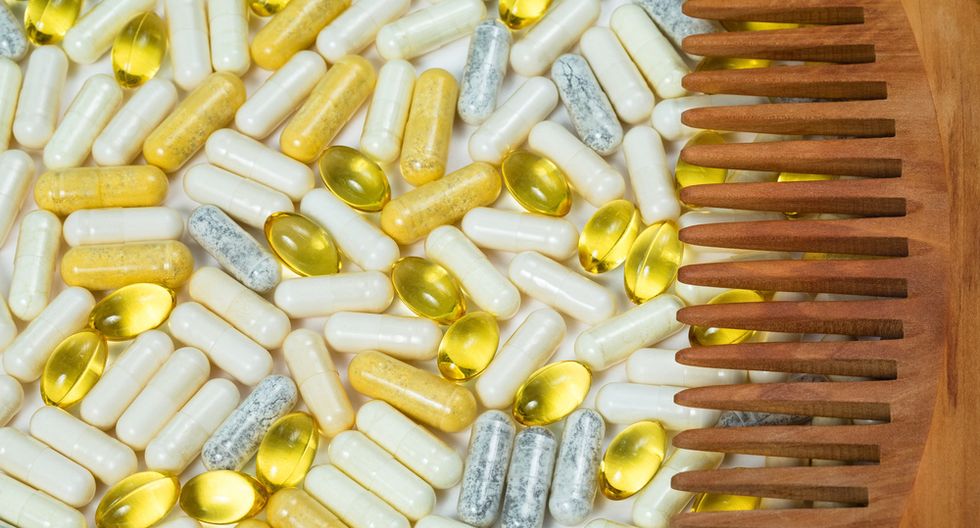
You're not going to see much change on the outside if you don't shift some of what you're feeding your insides. That said, it's not a random coincidence that a lot of people who deal with hair breakage are typically low in certain nutrients. Vitamin C (via foods like citrus fruits, sweet potatoes and tomatoes) helps to neutralize free radicals. There are studies that connect a lack of hair retention in Black women to them being low in iron (you can get more iron by eating blackstrap molasses, lentils and chicken). Zinc (by way of foods including whole grains, seeds and eggs) works to give your hair follicles the protein that they need. B-complex (which you can get from eating salmon, dark leafy greens and beef) strengthens the structure of your hair strands. Vitamin D (via cheese, orange juice and fortified cereals) helps to regrow hair follicles. If you want to get some extra support outside of adding foods with these to your diet, you can always take a multivitamin or a supplement that has one or more of these in it.
6. Move Your Hair Accessories Around
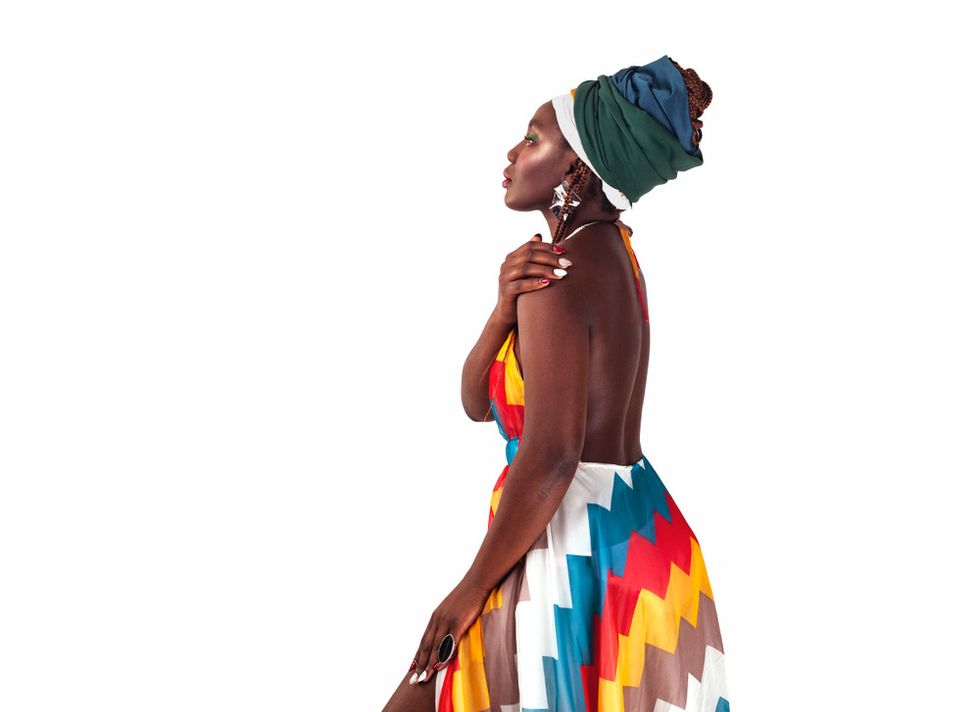
I'm a hat kind of gal. Unapologetically so. But I did have to start lining some of mine with satin and lay off of rocking them the same way all of the time because the friction was weakening the sides of my hair. I don't care if it's a brim, a headband or a turban, no one's head was designed to keep something on it, all day and night, non-stop, for days and weeks on end. When you do wear hair accessories, make sure they are lined so that your hair is protected and doesn't dry out (learn how to line a turban here and a beanie here). Try and avoid always placing your accessories in the same spot, each and every time too. And, for heaven's sake, give your hair a break. Your scalp needs to breathe, just like any other part of your body. And because your edges and nape tend to be more on the fragile side, they could use time when they don't have to deal with so much "pressure".
7. Leave Your Hair Alone
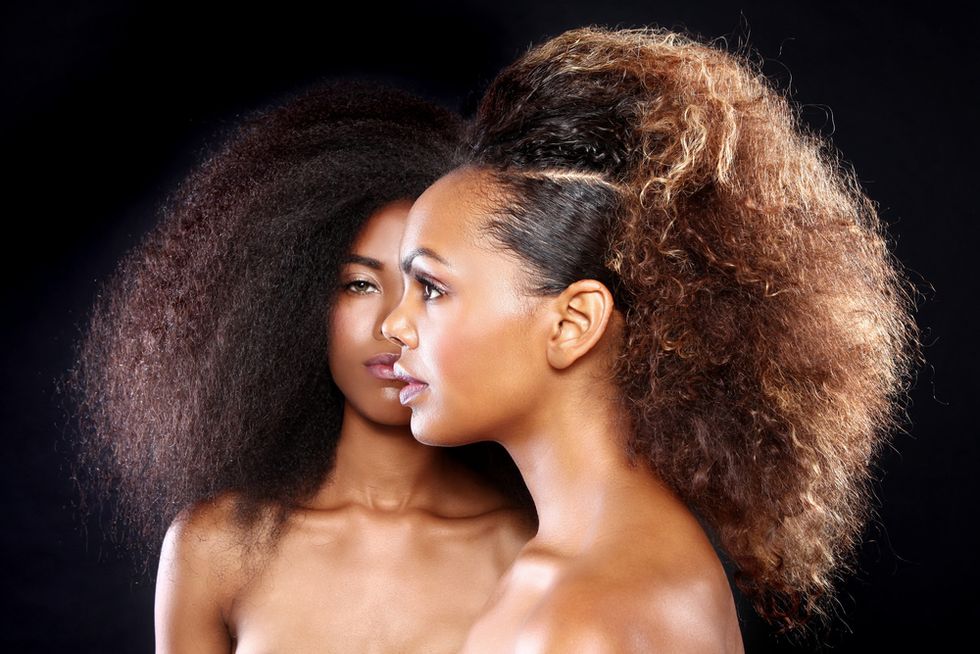
Combs. Brushes. Hair dryers. Flat irons. Hands. Bless our hair's heart. While you probably already know that constantly messing with your hair can lead to breakage and potential balding, have you ever wondered why? Dry and brittle hair tends to be the kind that breaks off rather easily and, as Black women (especially if you happen to have type 4 hair), we oftentimes have fragile hair. It's because our curls are so tight that our natural oils aren't able to easily flow from the top of our head to the ends of our hair (which is the oldest part of our hair). As a direct result, we have to be extra careful with how we handle our hair. It needs to be deep conditioned. Protective styling is a good look. But more than anything, we need to just leave it be. The more we touch and style our hair, the more we rob it of the oils that it needs to stay moisturized and "elastic". So, if you want your edges and nape to have more than a couple of inches, leave them alone so that they can grow.
Sometimes the simplest things bring forth the biggest results. Perfect edges mean nothing if they ultimately lead to baldness. Leave them be, chile. Leave. Them. Be.
Want more stories like this? Sign up for our newsletter here and check out the related reads below:
Looking For Hair Growth? It Might Be Time To Bring 'Blue Magic' Back
7 Essential Oils All Naturalistas Need For Their Hair
Uncommon (But Totally Natural) Things That Are Great For Hair Growth
These Foods Will Give Your Skin & Hair The Moisture They Crave
Feature image by Shutterstock


